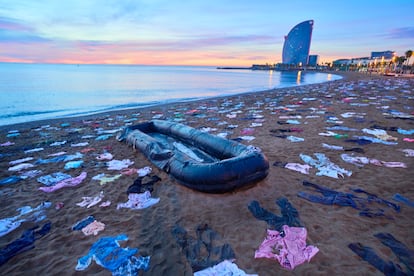2023, the year of the anti-immigration offensive
In the last twelve months, we have witnessed the political and regulatory tightening of the worst impulses against migrants around the world. It will be difficult for us to reverse this drift

There are a few things to criticize about the new British Conservatives, but none of them are ambiguity. No matter whether they talk about climate, trade or the conflict between Israel and Palestine, if there is a chance to tighten the rope, they will do so gleefully. In no area, however, has their self-confidence been greater than in migration, where Tory leaders are letting the world know that it is international law that must adapt to their electoral fantasies, and not the other way round. Just a few days ago, Prime Minister Rishi Sunak intervened before Giorgia Meloni’s national-populist coven in Rome to declare his own war: “Enemies,” he warned, were deliberately “driving people to our shores to try to destabilize our societies.”
The irony is that Sunak is a “bleeding heart” compared to his former home ministers, the daughters of immigrants Priti Patel and Suella Braverman. They are at the forefront of a “punk” conservatism that sets the tone for immigration policies across half the planet. In addition to organizing “raves” like the one in Rome, their representatives violently coerce their adversaries, lie through their teeth, and have placed such a fan in front of their ideological garbage that it is already difficult to find a centrist government — right or center-left — that has not been sullied with it. The new accepted truth is that human mobility constitutes an existential threat to our societies. It is a threat in the face of which everything is justified, even that which does not fit into our conception of “flower power” of the rule of law.
If you have lived on planet Earth for the last 20 years, you will already know that this argument is not new, but my feeling is that 2023 will be remembered as the moment in which norms and institutions stopped constraining political slogans and started adapting to them. In regions of the world as different as Europe, North America, Africa, and Latin America, we have witnessed a domino effect whose consequences will be difficult to reverse. The anti-immigration offensive is particularly evident on the borders of the destination regions, where sympathy is criminalized, and an extensive and complex legal industry is making a killing with immigration control measures. Within the countries themselves, the institutional harassment of millions of undocumented workers and their families is accepted with the naturalness typical of a de facto apartheid.
Far from the gaze of voters, the logic of externalizing immigration control has turned the routes into true paths of suffering and has put our governments in the hands of a collection of autocrats and criminal gangs that any other time would only have been invited to The Hague.
Few political agreements illustrate this drift better than the Migration and Asylum Pact, recently approved by the European institutions. Three years of political horse-trading has left some basic headlines. The first is that Member States unanimously share the need to strengthen the EU’s external borders. If that means militarizing the European border agency (Frontex) and turning it into an accomplice in state crimes, so be it. Fortunes will be invested in “discouraging” human mobility at the destination, in transit, and at its origin, Orwellian personal identification systems will be established, and the message will be spread that only hell awaits those who use irregular means to access paradise.
The pact’s second major area of interest is in how it deals with sharing responsibilities in matters of international protection. The signatories all agree on the central importance of this point, but their positions are divided into two tribes: those who will do everything possible to avoid their responsibility for asylum, but admit that it will be inevitable that the EU will assume part of it; and those who openly look the other way. In the first group are the countries of the Southern strip, in addition to France, Germany, and the Nordics. They are the ones who have designed the externalization model, have militarized their borders, or have replicated such brilliant ideas as “protecting” refugees in bellicose dictatorships like Rwanda. The other side is that of the Eastern countries, led so far by Hungary and Poland (although the latter could defect soon). For this group, international law only applies to their cousins in Ukraine — although, it must be said, with them Europe has shown how far it can go when it wants — and they have welcomed the new mechanism of fines for those who reject refugees with such edifying terms as “rape… in legal terms.”
The most striking thing about the new European pact, however, is not what it says, but what it omits. And at this point it is also possible to identify an evil that has spread to other regions of the world. Despite the fact that more than 80% of migration is strictly labor-related in nature and that the main destination economies in rich regions face an existentially challenging demographic, no one seems to be thinking about how to govern these flows. With the exception of a hardly innovative mechanism to facilitate the arrival of highly qualified personnel and toothless rhetoric regarding temporary mobility and adaptation of talent to the needs of our labor markets, the European Pact on Migration and Asylum is a wasteland. That’s not very surprising, considering that the negotiations have been led by experts in crime and terrorism, not in employment, social security, growth, taxation, and the other areas that are monumentally benefited by people who choose to settle and work in the EU.
The direct consequence of this political imbalance will be the increase in irregular immigration flows — the vast majority of which do not arrive by boat, but by plane — and the hidden competition to attract talent. Because while Spanish Minister of the Interior Fernando Grande-Marlaska crosses red lines on the southern border and German Chancellor Olaf Scholz announces a draconian tightening of his country’s immigration policy, the labor departments of their respective governments perform semi-clandestine administrative juggling to regularize existing workers and attract the hundreds of thousands of people that our economies need, at all levels of qualification.
Replace “Europe” with “United States” and “Germany” with “Chile” and you will find very similar stories, in which it is difficult to know if the immigration policy is more immoral than idiotic. Unfortunately, it’s going to get a lot harder before it starts to get better. The year 2023 has also seen the coordinated consolidation of these national-populist movements around the world. Some have managed to enter government or form parliamentary coalitions, but many have managed to break the “cordons sanitaires” that the moderate right had imposed on them until now. From the Latin America of Milei, Kast, and Bukele to the Europe of Meloni, Wilders, Abascal, and Orbán, passing through the ultranationalism of Trump, Putin, and Modi, the world is becoming a place that is violently hostile to diversity and social transformation that migration represents.
What can we do, besides pray? Frankly, in this field I expect very little from leadership like that of prime minister Pedro Sánchez, who has assimilated the existing political framework to the point of (literally) burying the Melilla tragedy of 2022. My hopes are for a bottom-up transformation of this debate and the role that non-state actors can play in it. Because 2023 was also the year in which the Popular Legislative Initiative for the regularization of undocumented people reached the Spanish Congress of Deputies. By far, it is the most important political process led by migrant organizations in Spain. The legislation will be discussed in the coming months and we do not know if the parliamentary groups will have the courage to rescue from “sub-citizenship” more than 400,000 men, women, and children who live, work, and dream in our country. Whatever they do, this initiative has already changed history, and that is also a reason to remember this year.
Sign up for our weekly newsletter to get more English-language news coverage from EL PAÍS USA Edition
Tu suscripción se está usando en otro dispositivo
¿Quieres añadir otro usuario a tu suscripción?
Si continúas leyendo en este dispositivo, no se podrá leer en el otro.
FlechaTu suscripción se está usando en otro dispositivo y solo puedes acceder a EL PAÍS desde un dispositivo a la vez.
Si quieres compartir tu cuenta, cambia tu suscripción a la modalidad Premium, así podrás añadir otro usuario. Cada uno accederá con su propia cuenta de email, lo que os permitirá personalizar vuestra experiencia en EL PAÍS.
¿Tienes una suscripción de empresa? Accede aquí para contratar más cuentas.
En el caso de no saber quién está usando tu cuenta, te recomendamos cambiar tu contraseña aquí.
Si decides continuar compartiendo tu cuenta, este mensaje se mostrará en tu dispositivo y en el de la otra persona que está usando tu cuenta de forma indefinida, afectando a tu experiencia de lectura. Puedes consultar aquí los términos y condiciones de la suscripción digital.









































